

Amazon. On 'View' Goldberg Holds up Cronkite as Paragon of Unbiased Reporting. So Whoopi Goldberg is a fan of the “We Report, You Decide” school of TV journalism. Who knew? Unfortunately, her choice of “fair and balanced” news icons leaves much to be desired. On ABC's “The View” Oct. 19, Goldberg said, “I don't get my news often times from any of the networks because, ya know, I'm from the Walter Cronkite generation, where they told you what was going on and you were left to make your decision. You were left to figure it out.”
But was Cronkite really the gold standard for impartial reporting? Back in 2006, the compiled quotes from Cronkite dating from the years after his 1981 retirement. In 2003 during an interview with Time magazine, Cronkite said that reporters, who see the “meaner side of life” and therefore have “sentimental feeling toward their fellow man,” are often misinterpreted “by some less-sensitive people as being liberal.” Cronkite advocated for gun control. Re-thinking Objectivity. Rethinking Journalism Ethics, Objectivity in the Age of Social Media. In response to the rapidly changing media environment, many schools and academic programs are offering novel approaches to journalism education.
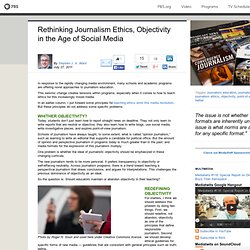
This seismic change creates tensions within programs, especially when it comes to how to teach ethics for this increasingly mixed media. In an earlier column, I put forward some principles for teaching ethics amid this media revolution. But these principles do not address some specific problems. Whither objectivity? Today, students don’t just learn how to report straight news on deadline. Schools of journalism have always taught, to some extent, what is called “opinion journalism,” such as learning to write an editorial that supports a candidate for political office. One problem is whether the ideal of journalistic objectivity should be emphasized in these changing curricula.
The new journalism tends to be more personal. The Media - Objectivity. Journalists often claim that their own biases and the pressures from advertisers and media owners do not affect their work because of their professional norm of 'objectivity'.
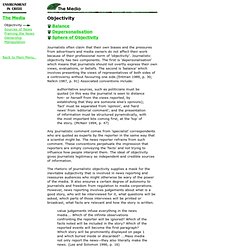
Journalistic objectivity has two components. The first is 'depersonalisation' which means that journalists should not overtly express their own views, evaluations, or beliefs. The second is 'balance' which involves presenting the views of representatives of both sides of a controversy without favouring one side. (Entman 1989, p. 30; Nelkin 1987, p. 91) Associated conventions include: authoritative sources, such as politicians must be quoted (in this way the journalist is seen to distance him- or herself from the views reported, by establishing that they are someone else's opinions); 'fact' must be separated from 'opinion', and 'hard news' from 'editorial comment'; and the presentation of information must be structured pyramidically, with the most important bits coming first, at the 'top' of the story.
MSNBC as Fox’s Liberal Evil Twin. Objectivity in Journalism. DAVID BROOKS There is some dispute about whether objectivity can really exist.
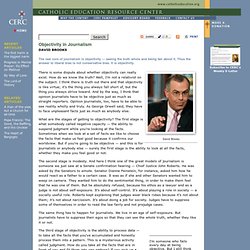
How do we know the truth? Well, I’m not a relativist on the subject. I think there is truth out there and that objectivity is like virtue; it's the thing you always fall short of, but the thing you always strive toward. And by the way, I think that opinion journalists have to be objective just as much as straight reporters. Opinion journalists, too, have to be able to see reality wholly and truly. What are the stages of getting to objectivity? The second stage is modesty. The same thing has to happen for journalists. The Myth of Objectivity in Journalism. By This page has been accessed since 29 May 1996.
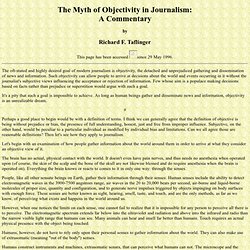
The oft-stated and highly desired goal of modern journalism is objectivity, the detached and unprejudiced gathering and dissemination of news and information. Such objectivity can allow people to arrive at decisions about the world and events occurring in it without the journalist's subjective views influencing the acceptance or rejection of information. Few whose aim is a populace making decisions based on facts rather than prejudice or superstition would argue with such a goal.
It's a pity that such a goal is impossible to achieve. Perhaps a good place to begin would be with a definition of terms. Let's begin with an examination of how people gather information about the world around them in order to arrive at what they consider an objective view of it. The brain has no actual, physical contact with the world. People, like all other sensate beings on Earth, gather their information through their senses.
The answer is no. Martha Raddatz and the faux objectivity of journalists. Numerous commentators (including me) were complimentary of the performance of Martha Raddatz as the moderator of Wednesday night's vice-presidential debate.
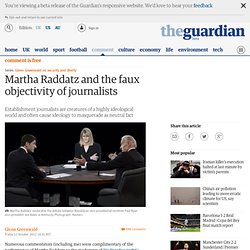
She was assertive, asked mostly substantive questions, and covered substantial ground in 90 minutes. That's all true enough, but the questions she asked reveal something significant about American journalism in general and especially its pretense of objectivity. For establishment journalists like Raddatz, "objectivity" is the holy grail. In their minds, it is what distinguishes "real reporters" from mere "opinionists" and, worse, partisans. As they tell it, this objectivity means they traffic only in straight facts, unvarnished by ideology or agenda.